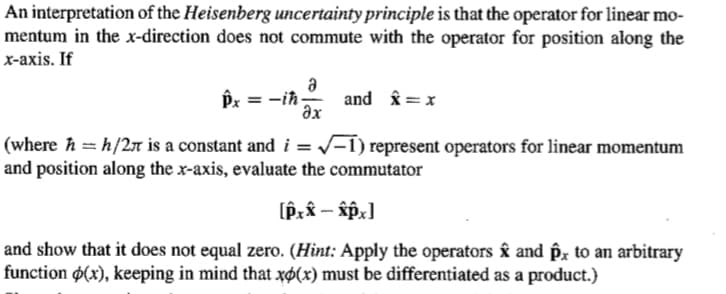An interpretation of the Heisenberg uncertainty principle is that the operator for linear mo- mentum in the x-direction does not commute with the operator for position along the x-axis. If x=-ih a ax and x = x (where h = h/2л is a constant and i = √-1) represent operators for linear momentum and position along the x-axis, evaluate the commutator [pxx - xpx] and show that it does not equal zero. (Hint: Apply the operators and px to an arbitrary function (x), keeping in mind that xo(x) must be differentiated as a product.)
An interpretation of the Heisenberg uncertainty principle is that the operator for linear mo- mentum in the x-direction does not commute with the operator for position along the x-axis. If x=-ih a ax and x = x (where h = h/2л is a constant and i = √-1) represent operators for linear momentum and position along the x-axis, evaluate the commutator [pxx - xpx] and show that it does not equal zero. (Hint: Apply the operators and px to an arbitrary function (x), keeping in mind that xo(x) must be differentiated as a product.)
Related questions
Question
An intepretation of the heisenberg uncertainty principle is that the operator for linier momentum in x-direction does not commute with the operator for position along the x-axis

Transcribed Image Text:An interpretation of the Heisenberg uncertainty principle is that the operator for linear mo-
mentum in the x-direction does not commute with the operator for position along the
х-ахis. If
a
Px = -ih- and î = x
əx
(where ħ = h/2T is a constant and i = /-1) represent operators for linear momentum
and position along the x-axis, evaluate the commutator
%3D
and show that it does not equal zero. (Hint: Apply the operators ây and êx to an arbitrary
function $(x), keeping in mind that xø(x) must be differentiated as a product.)
Expert Solution
This question has been solved!
Explore an expertly crafted, step-by-step solution for a thorough understanding of key concepts.
Step by step
Solved in 2 steps

Knowledge Booster
Learn more about
Need a deep-dive on the concept behind this application? Look no further. Learn more about this topic, advanced-physics and related others by exploring similar questions and additional content below.